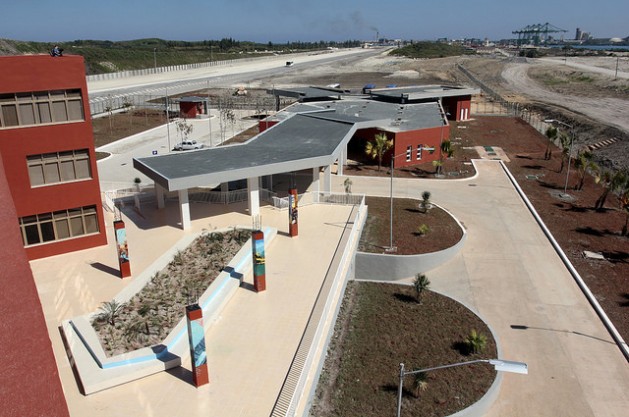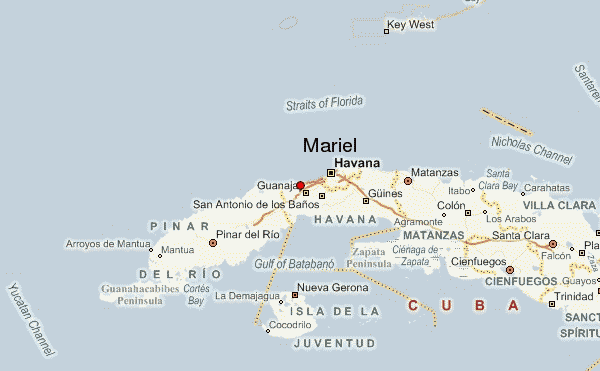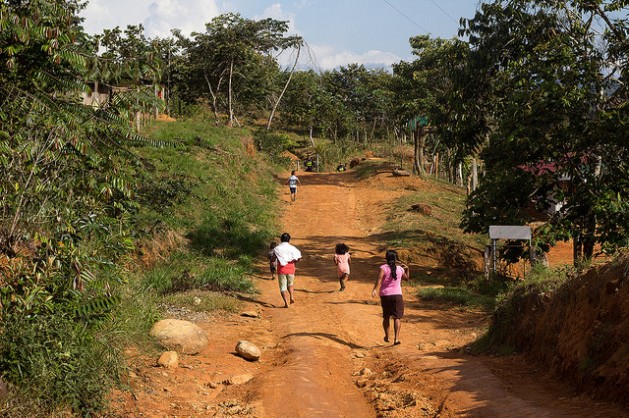Judi Lynn
Judi Lynn's JournalCuba Sees Its Future in Mariel Port, Hand in Hand with Brazil
Cuba Sees Its Future in Mariel Port, Hand in Hand with Brazil
By Patricia Grogg

[font size=1]
The container terminal administrative building in the port of the Mariel special economic development zone in Cuba.
Credit: Jorge Luis Baños/IPS[/font]
HAVANA, Aug 22 2014 (IPS) - The Mariel special economic development zone, the biggest construction project undertaken in decades in Cuba, emerged thanks to financial support from Brazil, which was based on political goodwill, a strategy of integration, and business vision.
“Cuba would not have been able to undertake this project from a technical or economic point of view,” economist Esteban Morales told IPS. He added that the geographic setting makes the development zone strategic in terms of trade, industry and services in Latin America and the Caribbean.
Brazil financed the construction of the container terminal and the remodeling of the port of Mariel, which is equipped with state-of-the-art technology to handle cargo from Post-Panamax container ships that will begin to arrive when the expansion of the Panama Canal is completed in December 2015.
Post-Panamax refers to vessels that do not fit in the current Panama Canal, such as the supertankers and the largest modern container and passenger ships.
The port, 45 km west of Havana, is located along the route of the main maritime transport flows in the Western hemisphere, and experts say it will be the largest industrial port in the Caribbean in terms of both size and volume of activity.
More:
http://www.ipsnews.net/2014/08/cuba-sees-its-future-in-mariel-port-hand-in-hand-with-brazil/
[center] [/center]
[/center]
Indigenous Leaders in Costa Rica Tell Ban Ki-moon Their Problems
Indigenous Leaders in Costa Rica Tell Ban Ki-moon Their Problems
By Diego Arguedas Ortiz

[font size=1]
A Costa Rican indigenous family runs to take shelter in the community of Cedror in the indigenous territory of Salitre on
Jul. 6, afraid of being attacked by landowners who occupied their land after setting fire to their homes and belongings the
day before. Credit: David Bolaños/IPSA [/font]
SAN JOSE, Aug 1 2014 (IPS) - Indigenous people in Costa Rica, hemmed in by violent attacks from farmers and ranchers who invade their land and burn down their homes, have found a new ally: United Nations Secretary-General Ban Ki-moon, who met with 36 native leaders during a recent visit to this country.
The leaders, representing eight indigenous groups, described the violence faced by native people in Costa Rica, and the many struggles they face, even in simply getting identity cards.
But they underlined that their most pressing concern is the occupation of indigenous areas by “the white man”, which has led to an escalation of attacks from landowners, who invade their ancestral territory and try to drive them off the land, despite a law that guarantees their right to collective ownership of their territory.
The latest violent episode occurred in the community of Cedror, in the Salitre indigenous territory in the southeast of the country. The Bribri people in Salitre had begun a process of recovering territory occupied by landowners or “finqueros”, who responded by burning down their modest homes and blocking access to their territory.
More:
http://www.ipsnews.net/2014/08/indigenous-leaders-in-costa-rica-tell-ban-ki-moon-their-problems/
Top Guatemalan general killed in air crash near Mexico border
Top Guatemalan general killed in air crash near Mexico border
Wed, Aug 20 2014
GUATEMALA CITY, Aug 20 (Reuters) - A top Guatemalan general and four other officers were killed on Wednesday when the helicopter they were in crashed near the country's northern border with Mexico, Guatemala's government said.
Chief of the Defense Staff General Rudy Ortiz and the four others had gone to inspect military installations when the Bell 206 helicopter came down in thick cloud in the village of El Nenton in the Huehuetenango region, the Defense Ministry said.
Guatemala's Defense Minister Manuel Lopez said the causes of the crash were still being investigated, but added he did not believe foul play had been involved.
The Central American country has one of the highest murder rates in the Americas and the government is battling to crack down on violent drug gangs from Mexico that use Guatemala as a staging post to move contraband north to the United States.
Ortiz, 51, had been touted as a potential future Defense Minister by Guatemalan media in recent weeks. (Reporting by Sofia Menchu. Editing by Andre Grenon)
http://www.reuters.com/article/2014/08/20/guatemala-general-idUSL2N0QQ2Z720140820?rpc=401&feedType=RSS&feedName=rbssIndustryMaterialsUtilitiesNews&rpc=401
(Short article, no more at link.)
[center]
General Rudy Ortiz[/center]
Regarding the Kaibiles of Guatemala:
This American Life on Guatemalan Genocide
Washington's role is a story not worth telling
By Keane Bhatt
01 Aug 2013
On the evening of December 4, 1982, President Ronald Reagan informed reporters assembled at an Air Force base in Honduras that he had just engaged in a “useful exchange of ideas” with Efraín Rios Montt. The Guatemalan military general was the most recent in a succession of U.S.-backed dictators who had been governing the country since the CIA first toppled its democratically elected president, Jacobo Arbenz, in 1954. “I know that President Rios Montt is a man of great personal integrity and commitment,” Reagan continued. “I know he wants to improve the quality of life for all Guatemalans and to promote social justice. My administration will do all it can to support his progressive efforts.” In a question-and-answer period, Reagan also shrugged off accusations of human rights violations committed by Rios Montt and his military: “Frankly I’m inclined to believe they’ve been getting a bum rap,” he declared.
Just two days later, on the evening of December 6, a 20-member team of Kaibil forces—elite Guatemalan commandos—initiated a military operation that decimated the inhabitants of the remote village of Dos Erres in the Petén region. The murder count of over 250 only hints at the savagery: In a matter of hours, the Kaibiles raped children (ProPublica, 3/25/12), forced miscarriages by jumping on pregnant women’s abdomens (Inter-American Court of Human Rights Judgment, 11/24/09) and flung at least 67 children down a well to their deaths (Seattle Times, 8/10/11), among other atrocities.
~snip~
Kaibil sergeant Pedro Pimentel, sentenced in 2012 to 6,060 years in prison for his role at Dos Erres (Guardian, 3/13/12), was invited to serve as an instructor at the School of the Americas, the U.S. military’s infamous training center for Latin American security forces, immediately after the 1982 massacre. The School had trained Rios Montt in 1950, and would in 1985 train Guatemala’s current president Otto Pérez Molina, who, as a Kaibil, likely committed atrocities himself (ProPublica, 5/25/12; SOA Watch; Democracy Now, 4/19/13).
But not once were the words “Reagan,” “Arbenz,” “School of the Americas” or “CIA” ever uttered in This American Life’s portrayal of Dos Erres. Rather than convey the reality—that the United States actively engaged in decades of state terror in Guatemala (Extra!, 5/1/99), or that the Kaibiles were armed and trained by the U.S. and its allies—Glass instead framed the U.S. government as a negligent bystander whose sin was solely a reluctance to speak out.
More:
http://fair.org/extra-online-articles/this-american-life-on-guatemalan-genocide/
The NRA’s Double Standard
Weekend Edition August 22-24, 2014
“The only thing that stops a bad guy with a gun is a good guy with a gun.”
The NRA’s Double Standard
by BRIAN J. FOLEY
After a crazed man shot and killed 20 students and six adults at the Sandy Hook Elementary School in Newtown, Connecticut in December, 2012, NRA Executive VP Wayne LaPierre said, “The only thing that stops a bad guy with a gun is a good guy with a gun.”
Nothing else. A good guy with a gun is the only thing. LaPierre’s response to the shooting at the Washington Navy Yard the following year (12 dead, 3 wounded) was the same: “There weren’t enough good guys with guns. When the good guys with guns got there it stopped.”
Almost a year to the day after the Newtown shooting, the NRA ballyhooed a school shooting that was, arguably, stopped by an armed guard:
The attacker’s rampage was stopped short by the quick response of an armed deputy sheriff who was working as a resource officer at the school. Upon learning of the threat, the deputy ran from the cafeteria to the library, yelling for people to get down and identifying himself as a deputy sheriff. The horrific incident lasted only a total of 80 seconds and ended with the shooter turning his gun on himself in the library as the deputy was closing in on him. ”We know for a fact that the shooter knew that the deputy was in the immediate area and, while the deputy was containing the shooter, the shooter took his own life,” Sheriff Robinson said. Robinson said the deputy’s response was “a critical element to the shooter’s decision” to kill himself.
NRA Institute for Legislative Action, “Stopped in 80 Seconds: Armed Response, Not Gun Control, Halted School Rampage”
(December 20, 2013).
More:
http://www.counterpunch.org/2014/08/22/the-nras-double-standard/
theHandpuppet posted,Anthropology:Genocide of the Ache People of Paraguay Will Be Tried in Argentina
Indian CountryGenocide of the Ache People of Paraguay Will Be Tried in Argentina
Rick Kearns
8/18/14
The Ache people of Paraguay have filed a criminal complaint of genocide and crimes against humanity committed against their people by various citizens, military and officials in the Paraguayan government for their role in the displacement, murder, enslavement and rape of the Ache from the 1950s through the 70s.
Based on evidence provided by survivors as well as anthropologists, human rights advocate, attorneys, journalists, priests and others, the story of what happened to the Ache people of Paraguay was presented to the Fifth Federal Court in Argentina in April after Paraguayan officials refused to prosecute the case.
According to Aitor Martínez, a Spanish attorney who is on the legal team that had filed the charges on behalf of the National Ache Foundation, they are awaiting trial dates from Argentine Judge Norberto Oyarbide. Judge Oyarbide agreed to hear the case based on the legal principle of 'universal jurisdiction' that allows for prosecution of charges of genocide and crimes against humanity in a foreign court if the judicial system of the home country did not prosecute the case.
In a recent interview, Martínez said that then Paraguayan President Alfredo Stroessner was informed of the atrocities by Paraguayan activists, officials from the United Nations and others but President Stroessner did not take any steps to stop the violence; some testimony also alleges that Stroessner, a United States ally at the time, spent time with pre-adolescent indigenous girls who had been forced into prostitution....
Read more at http://indiancountrytodaymedianetwork.com/2014/08/18/genocide-ache-people-paraguay-will-be-tried-argentina-156444
Anthropology:
http://www.democraticunderground.com/12291612
Nicaragua’s latest revolution: Becoming a green energy powerhouse
Nicaragua’s latest revolution: Becoming a green energy powerhouse
By Tim Johnson
McClatchy Foreign Staff
August 22, 2014 Updated 29 minutes ago
RIVAS, Nicaragua — How quickly can a nation wean itself from fossil fuels and move toward reliance on renewable energy? In the case of Nicaragua, it can move very, very fast.
So fast, in fact, that Nicaragua is drawing a parade of distinguished admirers coming to examine how the nation is radically changing its energy footprint with an aggressive goal of becoming a green energy powerhouse.
“This is a very impressive wind park,” United Nations Secretary-General Ban Ki-moon said July 29 on visiting windmills near this city on Lake Nicaragua. “Your country has vast potential of renewable energy resources – solar, wind, you have very strong, constant wind, and geothermal and hydro. You are quite lucky.”
Nearly as breathtaking as the speed at which Nicaragua has embraced private renewable energy plants is its emergence in less than a decade from an energy crisis of constant rotating blackouts.
Read more here: http://www.mercedsunstar.com/2014/08/22/3807633_nicaraguas-latest-revolution-becoming.html?rh=1#storylink=cpy
Chilean Schindler's List' saved leftists from regime
Chilean Schindler's List' saved leftists from regime
By Miguel Sanchez (AFP) 11 mins ago.
During the darkest days of Chile's dictatorship, a man named Jorge Schindler saved dozens of leftist militants by employing them undercover at his pharmacies, risking his own life like a different Schindler during another of history's nightmares.
The South American Schindler's story was published for the first time Friday in "The Chilean Schindler's List," a biography.
It retraces his silent struggle against Augusto Pinochet's brutal regime and the uncanny parallels with Oskar Schindler's secret defiance of Nazi Germany. The two men are not, however, related.
Jorge Schindler was an active member of the Chilean Communist Party when Pinochet's troops overthrew socialist president Salvador Allende on September 11, 1973.
More:
http://www.digitaljournal.com/news/world/chilean-schindler-s-list-saved-leftists-from-regime/article/398782#ixzz3B9ig7uj0
UN failed to save 'hundreds of thousands of lives'
Source: Channel 4 News
Friday 22 August 2014 World
UN failed to save 'hundreds of thousands of lives'
In her final speech to the UN security council, UN human rights chief Navi Pillay says a focus on short-term interests stopped the group from preventing large scale human suffering.
In a stinging address to the 15-member body, Ms Pillay criticised the group's indecision and failure to act.
"Short term geopolitical considerations and national interests, narrowly defined, have repeatedly taken precedence over intolerable human suffering and grave breaches of and long term threats to international peace and security," she said.
"I firmly believe that greater responsiveness by this council would have saved hundreds of thousands of lives."
It was her final briefing after six years in her role as UN High Commissioner for Human Rights, and she said that crises in Syria, Afghanistan, Central African
Republic (CAR), Democratic Republic of Congo, Iraq, Libya, Mali, Gaza, Somalia, South Sudan, Sudan and Ukraine "hammer home" the international community's failure to prevent conflict.
Read more: http://www.channel4.com/news/united-nations-failure-cost-lives-navi-pillay-video
War’s Facilitators
Weekend Edition August 22-24, 2014
Richard House’s "The Kills"
War’s Facilitators
by CHARLES R. LARSON
Richard House’s colossal novel, The Kills, is composed of four separate novels, augmented by additional material (videos and extended passages) on line. It’s utterly brilliant, sui generis, compelling (except for one small lapse), and totally disturbing for what it says about America’s Iraq “experience.” No more devastating account of the war has been written, yet the focus is not on the military or soldiers but the contractors, non-combatants, employed by the thousands to support the military: build roads, bridges, entire cities, and bring in all the goods necessary to feed, clothe, and provide shelter for the fighters. Think of Dick Cheney’s beloved Halliburton Corporation and the way he hyped the need to invade Iraq in order to line his pockets and those of his friends. In short, the Iraq war was a business venture from day one, nothing else.
In Book I, “Sutler,” non-combatants are in the early stages of constructing “one of the largest engineering projects ever attempted. A new city in the desert…the gateway to the world’s largest oil reserve. It was supposed to make up for the failures of Baghdad (but) the plan was so large, so extraordinary, that no one had their eyes on him,” (Sutler, the man brought in to build the project). Sutler has 53 million dollars at his disposal, yet barely has the project begun—it’s near the end of the war—before he’s told to close it down. What’s been implemented is a series of burn pits, huge holes in the sand, large enough that there isn’t anything that can’t be destroyed: entire vehicles, “chemical, human, and animal waste,” including body parts, and—later—government documents. In essence, covering up the evidence.
Then the directive comes that the entire site must be destroyed; the project is aborted, and Sutler (who has been in Iraq on a fake passport and given a pseudonym) is told to get out of the location immediately and he’ll be rewarded with enough money in foreign bank accounts that he’ll be adequately compensated. The plan backfires; there’s an explosion, people are killed or injured, Sutler flees, and his puppeteers believe he has access to most of the 53 million. Much later, in Part II, another character puts all these events into context: “This is how government works. They make decisions, they appoint money to those decisions, and they expect others to bid and take on those projects. There’s a whole complicated structure for this which has government agencies and private businesses at each other neck and neck. It’s in everyone’s interest to have the money used up before it gets sucked back. That’s how it works around here. “ Except that is this case the money was barely used.
Most of the rest of Book I segues into an elaborate plan to track Sutler down, as he flees overland, into Turkey eventually and beyond. Sutler is robbed on one occasion, loses the codes for the bank account transfer of the money rightfully his, and that richard_house_the-killsincident and its aftermath introduce several new characters in pursuit of him, with bodies strewn along the way, implying that his employer for the whole project, HOSCO International, operates outside of the law not only within Iraq but beyond. The intrigue, the pursuit, takes on the aura of the best espionage novel, with numerous tense scenes and cliffhangers, as chapters abruptly end and the narration shifts to another character.
More:
http://www.counterpunch.org/2014/08/22/wars-facilitators/
Guilty plea set in Cuban ballplayer smuggling
Aug 22, 3:02 AM EDT
Guilty plea set in Cuban ballplayer smuggling
By CURT ANDERSON
AP Legal Affairs Writer
MIAMI (AP) -- The accused leader of a human trafficking ring is set to plead guilty to U.S. charges involving the smuggling of more than 1,000 Cubans, including baseball players such as Texas Rangers outfielder Leonys Martin.
A federal judge set a Friday afternoon hearing in the case of Eliezer Lazo, who is already serving a five-year prison sentence for money laundering in a Medicare fraud case. Prosecutors say Lazo and others smuggled Cubans into Mexico, where they were held until ransom payments were made.
Authorities are seeking forfeiture of bank accounts controlled by Eliezer Lazo, including one traced to a purported Mexican baseball academy used to showcase players for Major League Baseball scouts. One of those players was Martin, who later signed a $15.5 million contract with the Rangers.
http://hosted.ap.org/dynamic/stories/B/BBA_RANGERS_MARTIN_RANSOM?SITE=AP&SECTION=HOME&TEMPLATE=DEFAULT&CTIME=2014-08-22-03-02-25
(Short article, no more at link.)
Profile Information
Member since: 2002Number of posts: 160,516